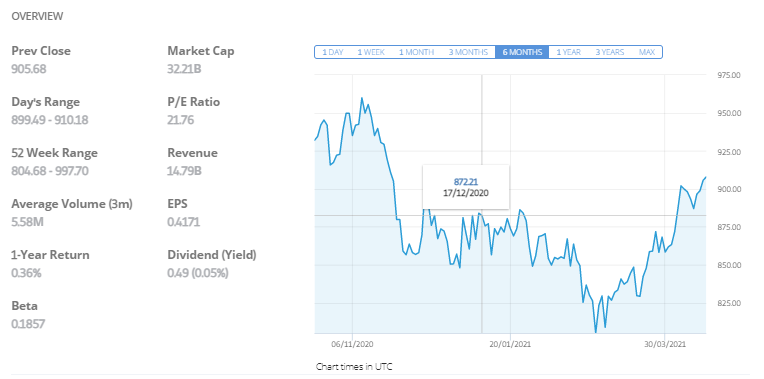The phrase ‘blue-chip company’ is applied to firms that offer investors a relatively safe investment. They can be in any sector or country and are identified by certain characteristics.
Large market caps – Blue-chips are large firms that are well-financed and well managed. They might not have particularly dynamic growth plans, but for them, slow and steady wins the race.
Reputation and track record – It takes time to develop a strong reputation with customers and shareholders. Years of investing in relationships with stakeholders results in the firms being seen as trustworthy.
Eight Of The Best UK Blue-Chip Companies
Blue-chips are firms that tick the above particular boxes. It’s possible to refine the definition by considering what is not a blue-chip company.
- Not all large-cap UK firms are blue-chips, but all blue-chips have large market capitalisations.
- Not all UK firms with strong reputations are blue chips, but all blue-chips have strong reputations.
If you’re looking to invest in blue-chip companies in the UK, your search will be limited to shares in the FTSE 100 index. That index contains the largest UK firms by market capitalisation, with the smallest firm of the 100 currently valued at £4.7bn.
1. Unilever (LON:ULVR)
Consumer goods manufacturer Unilever has been selling everything from baby food to soap powder since 1929. It has a global client base with an estimated 2.5 billion people using its products every day. All that revenue means it is consistently one of the largest firms in the UK. It has a market capitalisation close to £100bn, strong and reliable revenue streams, a diversified product portfolio and a share price that is currently in the doldrums.
As the share prices of blue-chip firms are unlikely to sky-rocket, buying the dips is an effective way of enhancing long-term returns.
2. HSBC (LON:HSBA)
Buying blue-chip stocks is a long-term strategy and HSBC is attracting attention because its share price is trading at the lower end of its long-term price range. The largest bank in the FTSE 100 index, HSBC has a valuation of £87bn. Its operations are spread across the globe, which spreads its risks. In February 2020, HSBC announced it was engaging in a long-term transformation plan.
An uptick in the fortunes of the banking sector could be on the horizon. Profit margins have been squeezed by historically low interest rates. If and when base lending rates start to move away from zero, HSBC could be expected to grow its margins and that would drive up this blue-chip’s share price.
3. Rio Tinto (LON:RIO)
With a market cap of £85bn, Rio Tinto is the largest blue-chip mining stock in the UK. It’s currently the fourth-largest firm by size in the FTSE 100 index and while it might not be a household name, it has a strong reputation in the mining sector, having been in operation since 1873.
Whereas investing in blue-chips like HSBC and Unilever offers a chance to bottom-fish the market, the Rio Tinto share price is already on the move. Mining sector stocks are associated with greater price volatility, so Rio Tinto represents a chance to scale up on risk-return but with a large, trusted, UK blue-chip company. If the much talked about ‘commodities super-cycle’ does come into play, investors in this blue-chip stock could generate significant returns.
4. Diageo (LON:DGE)
Drinks-maker Diageo didn’t have a good last 12 months and that is reflected in its share price. The share price hit an all-time high in 2022 but has since fallen almost 30% in the past year.
DGE still warrants it’s place as one of the UK blue-chips, but you would want to look for signs of strength, and retest of support before jumping in.
5. British American Tobacco (LON:BATS)
Investing in tobacco products isn’t for everyone, but those willing to hold their nose can take advantage of BAT being unfashionable but profitable. Over the last four years, BAT has generated dividends for investors, which represent a +5% yield, making it one of the highest dividend blue-chip stocks in the UK.
For as long as the BAT share price trades at the bottom of its long-term price range, high-yield investors will be able to buy into the firm and generate reliable returns in excess of what they’d receive on their cash savings account.
6. Prudential (LON:PRU)
Market volatility over the last year has acted as a reminder that investing in stocks can be a risky business. Many would assume that one of the best blue-chip picks in the UK, for those looking for security as well as capital return, is the insurance and investment firm Prudential. The last 12 months have painted a contrasting picture, with the stock down almost 35%, leaving PRU awfully close to 5 year lows.
The UK-based multinational firm was founded in 1848, so has had enough time to establish itself in a market that relies on trust and where brand names are important. With operations in the UK, US, Asia and Africa, the firm has diversified its risk across the world’s regions and has a market cap of around £18bn.
7. Vodafone (LON:VOD)
On a long-term price-chart, the share price of Vodafone can be seen to be at the bottom of its price range. But the recent break out of the downward trend line is catching the attention of investors.
Over the past 5 years, the valuation of this blue-chip UK company has dropped by more than 50%. The company’s management team is working to reduce the amount of debt on the firm’s balance sheet, which would take the telecoms giant deeper into the heart of the pool of blue-chip stocks.
8. National Grid (LON:NG)
Whatever the circumstances in global markets, everyone needs electricity in the modern age. This has been reflected in the National Grid share price, which didn’t fall away as much as those of other UK blue-chip stocks during difficult periods such as the Covid pandemic.
Between 2011 and 2016, the share price of National Grid more than doubled in value, confirming that security and equity growth don’t have to be mutually exclusive. The pace has slowed significantly from that point, with 5% gains over the past year supported by dividends above 5%.
The firm is a much sought after high-yield stock and has continued to increase dividend pay-outs. The UK electricity network is undergoing a transformation, which will require substantial investment, but National Grid’s upgrade plans are already in motion, making this a UK blue-chip to buy now.
Top 5 Forex Brokers:
Top 5 Crypto Brokers:
Top 5 Stocks Brokers:
The Advantages of UK Blue-Chip Stocks
Reliability
Being well known can be an advantage to household names such as Unilever, which use their strong brand recognition to maintain customer loyalty and preserve revenue streams. This also forms barriers to entry to any newcomers.
Security
Blue-chip stocks also come under a lot more scrutiny than smaller firms. With so many institutional investors holding multi-million-pound positions, it can be taken for granted that extensive due diligence has been carried out on many occasions.
Ease of Access
Most brokers provide markets in UK blue-chip shares. With such high trading volumes going through the market each day, pricing is transparent, spreads are tight and getting stuck in a position unlikely.
Free Research & Analysis
Being prime targets for investors means third party research firms and news services provide extensive coverage of blue-chip companies in the UK.
Favourable Tax Terms
Blue-chip stocks in the UK are often included in long-term investment schemes such as ISAs (Individual Savings Accounts), which offer Capital Gains and Income Tax breaks.
What to Know Before Investing in UK Blue-Chip Companies?
The fundamental investment risks still apply. Diversifying your capital across a range of names will mitigate single-stock risk and even blue-chips can get it wrong. The UK’s leading supermarket, Tesco, suffered an existential crisis in 2014 thanks to an accounting scandal, which wiped billions off the firm’s market value.
Most of the established brokers offer markets in the UK blue-chip stocks. Those that specialise in large-cap equities may provide more research, analysis and news. All of them will offer a slightly different approach to the trading experience they provide to their clients, so trying them out ‘hands-on’ using a risk-free demo account is highly recommended.
Some traders speculate in blue-chip companies using short-term strategies, while others invest in them for the long-term. The former lean towards using technical analysis-based strategies, which use market data to spot short-term pricing anomalies. Investment decisions for buy-and-hold investors tend to draw more on fundamental analysis and the firm’s long-term prospects.
In reality, using a combination of the two can help you optimise your trade entry and exit points. Fundamental analysis might help you identify a stock you want to invest in, and technical analysis can then help you identify the optimal time to do so.

Summary
Investing in blue-chip UK stocks is an ideal way to start off trading the markets. The familiarity of the brands, the extra comfort gained from big institutions also holding shares, and the additional credibility of them being a member of the FTSE 100 all combine to provide some comfort.
Removing emotion from trading is highly recommended as it helps you follow long-term strategies rather than panic due to short-term fluctuations. Even those traders who move on to explore strategies with higher levels of risk-return may well keep a percentage of their portfolio devoted to UK blue-chips as they can help stabilise returns.























